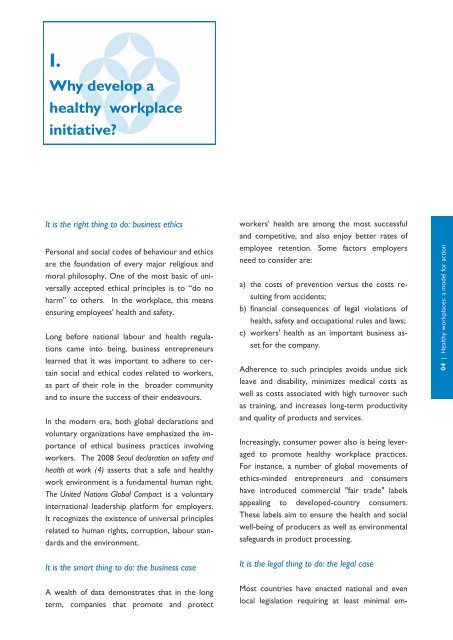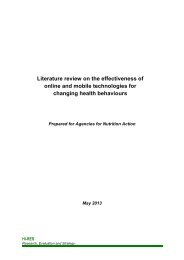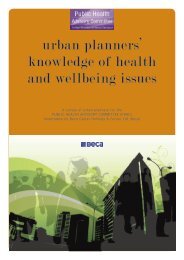Healthy workplaces: a model for action - World Health Organization
Healthy workplaces: a model for action - World Health Organization
Healthy workplaces: a model for action - World Health Organization
Create successful ePaper yourself
Turn your PDF publications into a flip-book with our unique Google optimized e-Paper software.
I.Why develop ahealthy workplaceinitiative?It is the right thing to do: business ethicsPersonal and social codes of behaviour and ethicsare the foundation of every major religious andmoral philosophy. One of the most basic of universallyaccepted ethical principles is to “do noharm” to others. In the workplace, this meansensuring employees' health and safety.Long be<strong>for</strong>e national labour and health regulationscame into being, business entrepreneurslearned that it was important to adhere to certainsocial and ethical codes related to workers,as part of their role in the broader communityand to insure the success of their endeavours.In the modern era, both global declarations andvoluntary organizations have emphasized the importanceof ethical business practices involvingworkers. The 2008 Seoul declaration on safety andhealth at work (4) asserts that a safe and healthywork environment is a fundamental human right.The United Nations Global Compact is a voluntaryinternational leadership plat<strong>for</strong>m <strong>for</strong> employers.It recognizes the existence of universal principlesrelated to human rights, corruption, labour standardsand the environment.It is the smart thing to do: the business caseworkers' health are among the most successfuland competitive, and also enjoy better rates ofemployee retention. Some factors employersneed to consider are:a) the costs of prevention versus the costs resultingfrom accidents;b) financial consequences of legal violations ofhealth, safety and occupational rules and laws;c) workers' health as an important business asset<strong>for</strong> the company.Adherence to such principles avoids undue sickleave and disability, minimizes medical costs aswell as costs associated with high turnover suchas training, and increases long-term productivityand quality of products and services.Increasingly, consumer power also is being leveragedto promote healthy workplace practices.For instance, a number of global movements ofethics-minded entrepreneurs and consumershave introduced commercial "fair trade" labelsappealing to developed-country consumers.These labels aim to ensure the health and socialwell-being of producers as well as environmentalsafeguards in product processing.It is the legal thing to do: the legal case04 | <strong><strong>Health</strong>y</strong> <strong>workplaces</strong>: a <strong>model</strong> <strong>for</strong> <strong>action</strong>A wealth of data demonstrates that in the longterm, companies that promote and protectMost countries have enacted national and evenlocal legislation requiring at least minimal em-
















